Hiring the first employee in a start-up (see column ‘Co-founders: Essential company or a crowd?’ dated August 14, 2023) is critical, but subsequent hiring is equally challenging where a young founder, busy building a product or service, is also responsible for talent.
Pundits will advise hiring people who are smarter than the founders. This is easier said than done. How does an entrepreneur assess how smart she is, in the first place, to determine whether the interviewee is smarter?
Over the years, I have developed a methodology and test candidates only for three things.
Attitude: Working in a start-up can be a culture shock for most people, especially those coming from a corporate background. Start-ups are basically chaos on steroids. There are hardly any processes or support systems, and most decisions are ad hoc. The only parameter is speed of action and decision-making. Employees must be able to survive, thrive and revel in such an environment.
An effective means to gauge this ability is to ask what the candidate learnt, liked, and disliked at earlier assignments and workplaces. With a bit of probing, one can get insights into the person’s attitude.
Problem-solving skills: The essence of a start-up is that employees are daily faced with new problems requiring quick resolution and thinking on one’s feet.
Try to find out how the person responded to unexpected firefightings and what she learned from the entire episode.
Ask about hobbies, extra-curricular activities, which always provides good openings. At an interview, a woman once told me she always carried a flute with her and played it to reduce stress and keep calm. I asked if she had it with her and whether she could play something for us? She didn’t have it but thought for a minute and quickly whistled a movie song while drumming a beat on the desk.
Willingness to take risks: Start-ups do not have much data and a lot of decision-making is through gut feel, which increases risk. Waiting for data means sacrificing speed, which is not an option at all.
During the interview, ask for things that went wrong. Push the candidate to share details of decisions that went wrong. Most interviewees are happy to talk about stuff they did well but are circumspect about sharing decisions that went downhill. A candidate who can openly talk about wrong decisions is someone who is open to feedback and fast learning.
So, isn’t domain expertise important? It is, but, frankly, domain knowledge is a bit overemphasised, especially in start-ups. We will discuss this in a future column.
(The writer is a serial entrepreneur and best-selling author of the book ‘Failing to Succeed’; tweets @vaitheek)










Comments
Comments have to be in English, and in full sentences. They cannot be abusive or personal. Please abide by our community guidelines for posting your comments.
We have migrated to a new commenting platform. If you are already a registered user of TheHindu Businessline and logged in, you may continue to engage with our articles. If you do not have an account please register and login to post comments. Users can access their older comments by logging into their accounts on Vuukle.